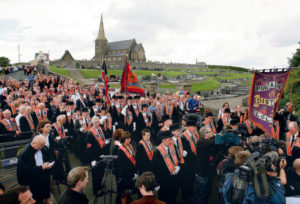Nelson McCausland del DUP ha accusato la Garvaghy Road Resident Coalition di cercare di introdurre una “apartheid culturale” in Irlanda del Nord

McCausland dice che i residenti “stanno cercando di reclamare la proprietà di speciali strade, dicendo «voi non potete andare là senza il nostro consenso».
“Non c’è altro modo di descrivere questo, tranne che parlare di apartheid culturale”, ha affermato.
Comunque, Breandan MacCionnaith, portavoce del GRRC, ha ribattuto che gli orangisti possono tornare indietro dallo stesso percorso da cui sono arrivati alla chiesa.
Per MacCionnaith se ci sarà un dialogo “allora tutte le opzioni saranno sl tavolo”.
McCausland, ministro della Cultura a Stormont, stava parlando dopo l’incontro di giovedì tra una delegazione del DUP e la Commissione Parate, organismo preposto a valutare le parate contenziose.
In una dichiarazione, la Commissione ha descritto l’incontro come “uno scambio positivo ed utile”.
“Chiediamo a tutti coloro che occupano una posizione influente di promuovere ed incoraggiare il dialogo a Portadown e ovunque le parate sono contestate”, si legge.
“La Commissione spera che tutte le parti a Drumcree vedranno il merito del dialogo ed è d’accordo che questa sia la migliore via d’uscita”.
Prima del 1998, i tentativi di impedire alla parata di scendere lungo Garvaghy Road portarono all’esplosione di disordini guidati dai lealisti a Portadown ed in tutta l’Irlanda del Nord.
Quando nel 1998 la parata venne fatta passare con la forza lungo la strada, i repubblicani fecero scoppiare disordini.
Tratto da BBC News
DUP in Drumcree march ‘cultural apartheid’ blast
The DUP’s Nelson McCausland has accused the Garvaghy Road Residents Coalition of trying to introduce “cultural apartheid” into Northern Ireland.
Mr McCausland said residents “were trying to claim ownership of particular roads and say ‘you cannot go there without our consent'”.
“There is not other way to describe that but cultural apartheid,” he said.
However, Brendan MacCionnaith, spokesperson for the GRRC, said that Orangemen could take the same route back from the church as the one they take to get there.
He said that if there was going to be dialogue “then all the options had to be on the table”.
Mr McCausland, Northern Ireland’s Culture Minister, was speaking after a DUP delegation met the Parades Commission, which rules on contentious parades, on Thursday.
In a statement the commission described the meeting as ” a positive and useful exchange”.
“We urge everyone in a position of influence to promote and encourage dialogue in Portadown and wherever parades are disputed,” it said in a statement.
“The Commission hopes that all parties in Drumcree will see the merit of dialogue and agree that it is the best way forward.”
Before 1998, attempts to ban the parade from going down the road resulted in loyalist rioting both in Portadown and across Northern Ireland.
However, when the 1998 march was forced through the Garvaghy Road it sparked republican rioting.